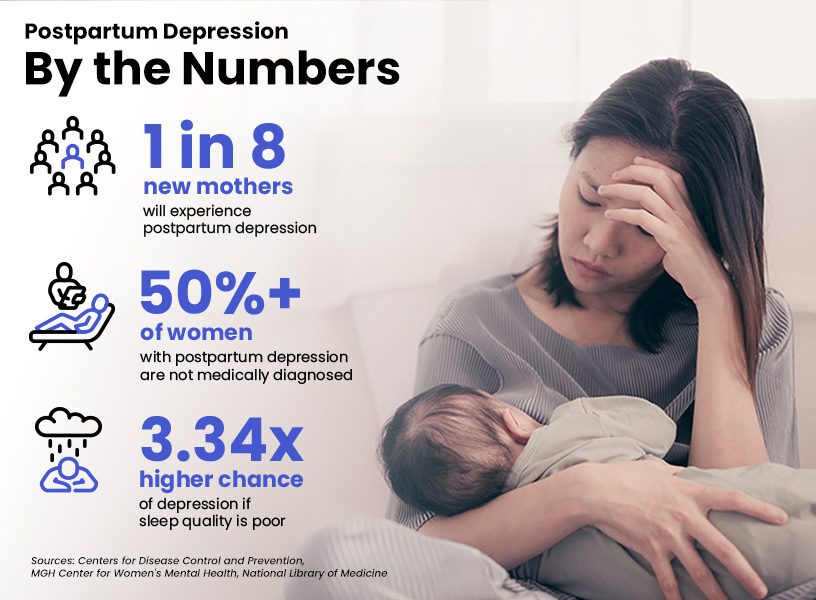Postpartum depression (PPD) is a condition that affects many new mothers. It can have a significant impact on the overall well-being of both the mother and her baby. Recent research has indicated that there may be a correlation between a mother’s mental health and her baby’s sleep schedule.

Credit: www.nutraingredients.com
Understanding Postpartum Depression
Postpartum depression is a type of mood disorder that occurs after childbirth. It can cause feelings of extreme sadness, anxiety, and exhaustion. New mothers experiencing PPD may have trouble bonding with their babies and may feel overwhelmed by the demands of motherhood.
The Importance of Baby Sleep Schedules
Establishing a consistent sleep schedule for a baby is crucial for their development and well-being. Sleep plays a vital role in a baby’s physical and cognitive growth. However, getting a baby on a regular sleep routine can be challenging for many parents, especially those dealing with postpartum depression.
The Link Between PPD and Baby Sleep
Recent studies have shown that there is a strong correlation between a mother’s mental health and her baby’s sleep patterns. Mothers who experience postpartum depression may find it more difficult to establish and maintain a predictable sleep schedule for their babies. In turn, irregular sleep patterns in infants can contribute to increased stress and exacerbate the symptoms of PPD in mothers.
The Impact on Maternal Well-being
When a new mother is struggling with postpartum depression, disruptions in her baby’s sleep can further intensify her feelings of stress and anxiety. Sleep deprivation, often exacerbated by irregular infant sleep patterns, can worsen the symptoms of PPD, making it even more challenging for the mother to cope with her condition.
Seeking Support and Solutions
It’s essential for mothers experiencing postpartum depression to seek support from healthcare professionals, family members, and support groups. By addressing both the mother’s mental health and the baby’s sleep schedule, it’s possible to alleviate the challenges associated with PPD and improve the well-being of both the mother and her baby.
Strategies for Managing PPD and Baby Sleep
For mothers dealing with postpartum depression and struggling with their baby’s sleep patterns, there are several strategies that can help improve the situation:
- Enlist the support of a partner, family member, or friend to assist with nighttime feedings and baby care to allow the mother to get adequate rest.
- Establish a calming bedtime routine for the baby to promote better sleep habits.
- Practice self-care and seek professional help for postpartum depression, including therapy and, if necessary, medication.
- Consider co-sleeping or room-sharing to make nighttime feedings more convenient for the mother and help both the mother and baby get more rest.

Credit: www.sleepfoundation.org
The Role of Healthcare Providers
Healthcare providers play a crucial role in identifying and addressing postpartum depression in new mothers. They can offer guidance and support for managing infant sleep patterns and provide resources to help mothers cope with the challenges of PPD.
In Conclusion
The relationship between a mother’s postpartum depression and her baby’s sleep schedule is a complex one. By recognizing the impact that PPD can have on infant sleep patterns and vice versa, mothers and healthcare providers can work together to address both issues effectively. With the right support and strategies in place, it’s possible to improve the well-being of both new mothers and their babies.
Frequently Asked Questions On Mothers Postpartum Depression Tied To Baby Sleep Schedules: Unlocking The Connection
How Does Postpartum Depression Affect Baby Sleep Schedules?
Postpartum depression can disrupt a baby’s sleep schedule due to the mother’s emotional state and reduced ability to meet the baby’s needs effectively.
What Are The Common Signs Of Postpartum Depression In Mothers?
Mothers with postpartum depression may experience feelings of sadness, exhaustion, loss of interest in activities, changes in appetite, difficulty bonding with the baby, and disrupted sleep patterns.
Can Postpartum Depression Be Treated?
Yes, postpartum depression can be effectively treated through a combination of therapy, support groups, lifestyle changes, and medication if necessary. Early diagnosis and intervention are crucial for successful treatment outcomes.
How Long Does Postpartum Depression Typically Last?
The duration of postpartum depression can vary from individual to individual, but it commonly persists for several months. Seeking professional help is essential for managing and overcoming this condition.
Leave a Reply